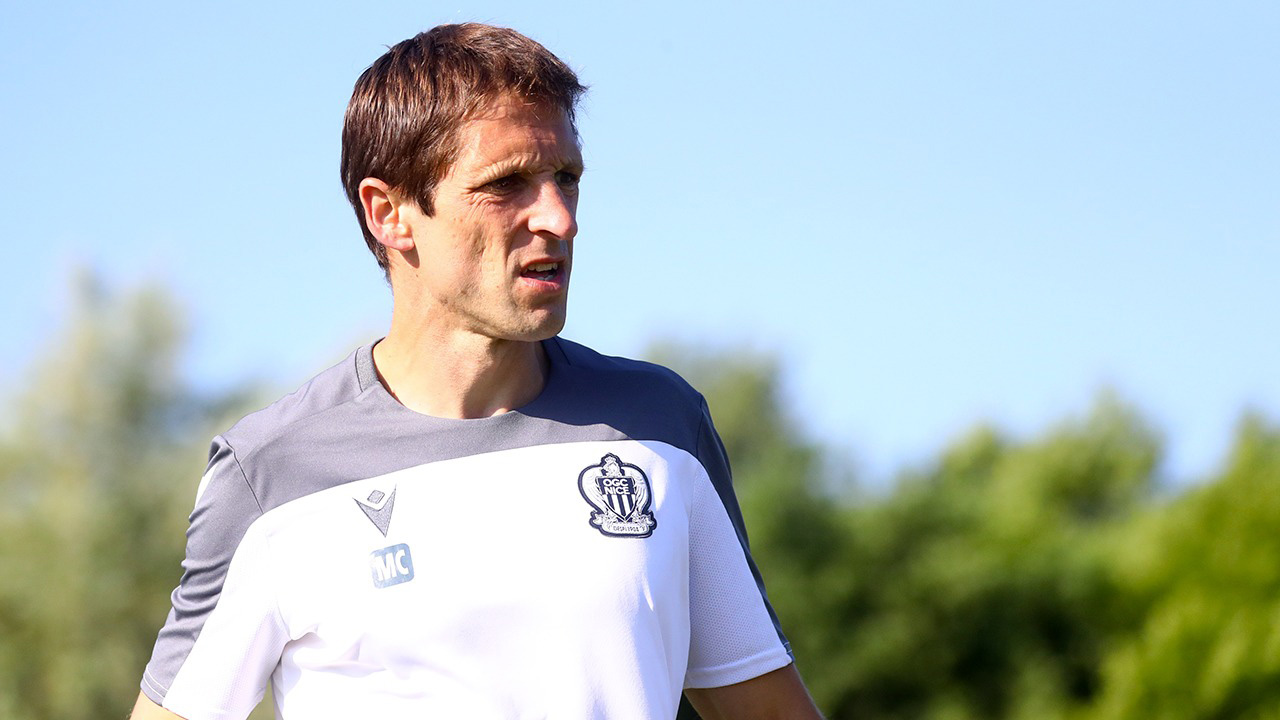
Interview
Hello Mister Cook
Sharp like a knife, able to lunge back to back without batting an eyelid, he is the man that we always see, but rarely hear. Arriving in Summer 2018, at the same time as Patrick Vieira, Christian Lattanzio and Kristian Wilson, Matt Cook leads Les Aiglons' physical preparations. The trip to Divonne offered the perfect possibility to speak with the coach in order to better understand the squad's efforts. We made the most of it. Better still, we went to town. The focus on the physical effort was quickly sacrificed, replaced by a much more personal interview. Even stronger. The glass has been smashed, this pure Londoner, with his accent, his English and his good ideas, allowed us to enter a universe where nothing is left to chance.
Matt Cook, the professional
Matt, the players seem to struggle at the start of summer, but they seem to be coping...
We gave them a programme of runs and strength work so that they would be in the right conditions when they came back to training, after a three week break. They respected the programme. And there was also a small group of players who were injured at the end of last season, who came back two weeks earlier than the rest of the squad, to catch up.
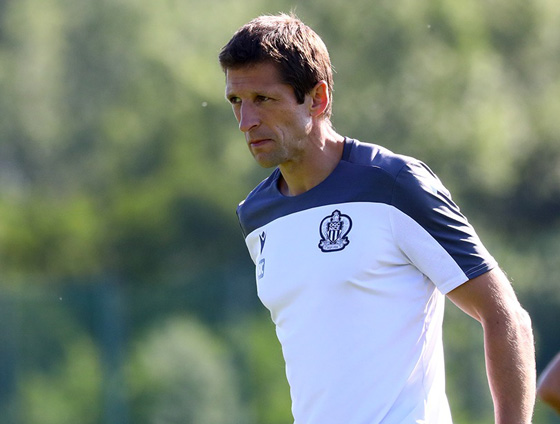
Are you satisfied with the match against PSV?
Yes because we were able to manage the player's game time, which is important. Some players played 30 minutes like Myziane, lots played 45. Racine (Coly) and Andy (Pelmard) took part in all of the game, but they started out wide, before moving into the centre of defence, where there are a lot fewer runs to make. This management of game time allowed us to avoid any potential injuries in this first match.
The players always work with the ball. Can you explain that to us?
The best way to be ready physically to play football is to play football. That's what we have been doing since we returned this summer. I don't think there is any point in running around the pitch, so all of our physical work is done with the ball. We try to construct drills that reproduce our way our playing, to save time, and above all, to save time for Patrick and the players.
“Each week is a new level”
Where does this method come from?
Originally, I think it was a Portuguese professor that taught this approach, which is called “Tactical Periodization”. Then, Mourinho made it popular. Since then, lots of Spanish coaches have used it and it has been used by teams all over the world.
When did you begin to use it?
As soon as I started working in football. And even before them, if I think back. Before working at City's academy, I spent seven years working for the English Olympic Sports: swimming, cycling, squash and even rugby. It was already the way I worked when I was involved in squash.
What do you mean?
When I arrived, the players used to go for long runs. After two weeks, I went to see the coach to tell him that in squash, they were never using this kind of effort. We suggested some practices that were adapted to the sport, with short intense acceleration and lots of changes of direction. I replicated this when I arrived at the Manchester City Academy in 2011. I remember as a player back in the mid-90s, that we used to go on lots of long-distance runs. This experience convinced me to develop a method in which the ball is everywhere, where at the same time, you are working physically, tactically and technically. You have to practise your sport as much as possible in order to perform, that is the case in everything. So, if in a one and a half hour session, you go for a thirty minute run, then an hour of ball-work, you have lost half an hour where you could have improved and shown the players the tactics that Patrick (Vieira) is looking for. You have to practise (he insists), practise to become better.
Are there levels to be met within physical preparation?
Each week is a new level. In the first three weeks, we progressively raise the intensity and the volume of the work. During the first two matches of the season, the players will not be entirely match fit because over the first six weeks, you are building up your workload, and even if you have a competitive match, you are still working a lot in the middle of the week. During these first six weeks, the players progress and we adjust the work based on what we see in the matches and what the GPS shows.
“All physical work is a complete workout”
Are the GPS monitors important for your work?
When you watch a training session, you have an idea of the intensity and the work put in. The GPS confirms what you have seen, but it can also show you where you have been wrong. It's an objective measure of what happens physically. It helps you to prepare for the next sessions.
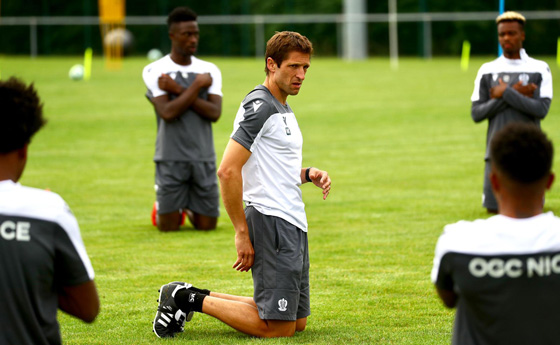
How then, do you go about the preparation of your sessions?
Patrick explains to us what he wants to improve on tactically and the way in which he wants to get there. With him and the other members of staff, we sit down and discuss. I give them my vision in terms of the physical side of things, the type of work we should be doing, how we can get there. Patrick establishes the content of the sessions based on all of these criteria.The coaches adjust them and define the roles of each person during the session. My job consists of taking this information and helping to structure the sessions, so that we don't do too much of one thing, and not enough of another, and that we aren't doing the wrong type of physical work at the wrong time.
What role does the invisible preparation play in the overall process?
It's fundamental and is just as important as training. All physical work is a total workout – the way in which your body adapts depends entirely on what you do.
Can you be more explicit?
Success is built in every moment. If you do bad things on the side, you lose 50% or 60% of the benefits of the training. On the other hand, if you have good habits, you reap 80% or 90% of the benefits. The two fundamentals to allow a body to perform are sleep and nutrition. If you sleep well and eat correctly, you can make the most of your work. Planning good menus and ensuring that the players have enough sleep is crucial. That's why you need to offer the players as much time as possible to rest between sessions. The physios and osteopaths also do remarkable work, you have to highlight it. Then, there are several elements that help recovery, like iced baths for example. All of these things added together allow players to adapt to training and to recover.
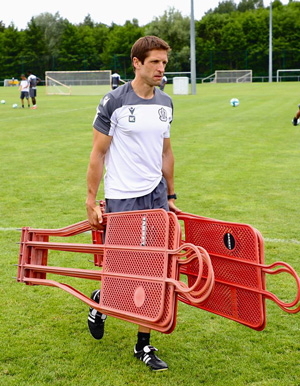
We hear a lot about the physical aspects in the summer. But in a classic week during the season, what happens to it?
There are always two days in the middle of the week when it's tough physically. But of course, it's always with the ball (smiles).
Does your work stop with the outfield players?
No, we speak a lot about the goalkeepers too, with Lionel (Letizi), Bernard (Cora) and the other fitness coaches. Most of their physical work is done in the gym.
Matt Cook, côté perso'
On a personal level, did you play football?
Yes, I was a goalkeeper, but not that great. When I was young, I played for West Ham and Peterborough. I played semi-pro when I was studying. But honestly, I wasn't the best (laughs).
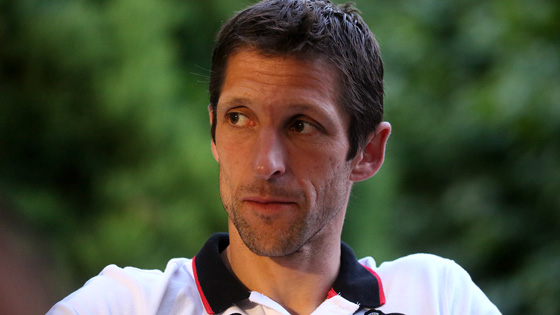
Which team did you support?
When I was small, I was a Tottenham fan. I was born in London, my dad was born in Wembley, my uncle, all of my family supported Tottenham.
Tottenham, the enemy of Patrick Vieira's Arsenal…
Exactly. I was jealous of their style of play which was very similar to Tottenham's back in the good old days. But I didn't start supporting them, because there are some things that can't change (smiles).
You have known the coaching staff for a while now.
Patrick, Christian, Kristian and I have known each other since Patrick started to coach in 2013. I worked at the Academy when he took over the reigns of the Manchester City Reserve team. I helped him to understand the physical drills that he could use. And now, Fred and Lionel are part of the same process. It's very difficult to add all aspects including the physical, technical and tactical into our work. If you don't spend long periods of time together, talking about sessions and planning, talking about the game and what the coach is looking for, you can't do it.
“Some do all they can to succeed, others don't: It's got nothing to do with the country”
You have worked in England, in the USA and in France: Are there differences between the mentalities of the players in the different countries?
There are some very professional players in France and others aren't really. In England and in the USA, it's exactly the same thing. It's got nothing to do with the country. Some do all they can to succeed, others don't.
Will your way of working evolve from the way you worked last season?
Yes. I learnt from last year. For example, we will do more aerobic work at the start of pre-season and we will almost certainly continue to do so throughout the season. It's the main lesson that we took from last year. We realised that we need to adapt, not to the country, but to the group of players we have here.

Which means that from now on, the players will be more ready?
What's for sure is that there will be no more adjustment time, for them and for us. When you arrive at a club, it's difficult to get up to level quickly, because all of the groups are different and you need to understand their needs. Even within each squad, every player is different.
Is pre-season the most important part of your season?
It's a good question. (After thinking) It's the time when I am busiest, because it's the time when we do most physical work and where you always need to adapt. I have to suggest sessions for those who arrive a week late, like Khephren. We will also work with Youcef, Malang and more generally, those players away on international duty, so that Patrick can use them as quickly as possible when they are back. Pre-season is also the riskiest time because players come back from holidays and need to get their physical levels back quickly. But to be honest, the work never stops. You need to be at your best at all times, to manage injuries etc.
“I never feel happy”
Do you ever get to the point where you are satisfied with your work?
Never (laughs). There are always things to improve. In every domain, I never feel happy.
In that case, what upsets you?
When we lose or when I see a team that is physically better than us. I really don't like that. In the same way as injuries. The only thing that makes me happy is my children. At work, you can always do better.
At the Allianz Riviera, you always watch Le Gym's matches from above the Press Box, why?
The first reason is that I don't travel with the team to away matches. I stay back to work with the players who aren't in the squad. I don't want to disrupt the routine by sitting on the bench at home. Their routine needs to be the same at home and away. The second is that I like to have an aerial view, it allows me to better observe what is actually happening on the pitch. On pitch-side, you focus on the ball and what is happening around it. From up high, I take notes and I check on the video if I saw it right.
Do you enjoy matches?
Only when we win (smiles)! It's a funny sort of pleasure. It's not the same as when I see my kids play. There is stress and pleasure at the same time.
Are you focussed on the physical aspects when you watch a match?
Clearly. I look at everything that needs to be improved, even if I am also interested in the score and what happens.
What is a physical player?
Most players are good in one area physically, but less good in others. Some are fantastic runners but aren't great with the ball at feet, or don't accelerate quickly. Inversely, others have great acceleration but are less good when it comes to changing directions. There really are very few players who are comfortable in every area. That's why we try to indvidiualise the physical work to a maximum, to try to make up for their weaknesses.
Do you have an example of this individualised work?
Of course. But that stays between the coaches and I.
Which player has everything you need?
(He thinks) Every position is different. Dante, for his position, has lots of qualities. Atal, Ganago or Allan too. Most players that we have got have the right attributes for their position, but there are always one or two things to improve, because we can always do better.
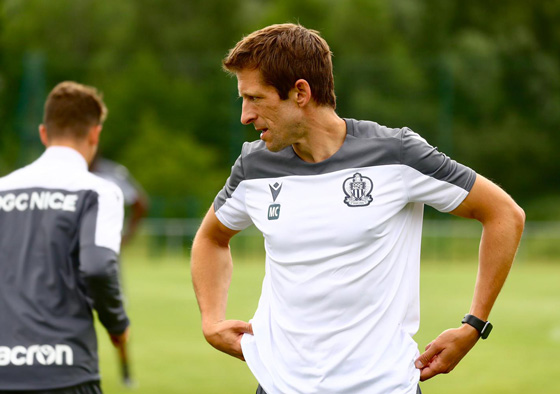
Do you keep an eye on the academy too?
When we arrived, we focussed solely on the first team, because we needed to put our work in place with the pros. Then in February/March, I started to involve Flo (Payet), Samir (Anba) and Arthur (Leblanc) (the Academy Fitness Coaches, Editor's note). First by explaining our work off the pitch, in the gym; then after that, what we expect of the youngsters who climb up to the first team, the efforts that they need to be able to put in when they make the step up. The 17, 18, 19 or 20 year old guys need to be able to follow. We spoke about this together and we adapted the content of the sessions. We also spoke with Flo about the structure of the weeks and the planning of sessions. To be honest, the Reserve team was already working a lot like us, they had the idea of developing the physical side of the game at the same time as other aspects of the game. So it wasn't a huge change.
When Le Gym buy a player, do you speak with the fitness coaches from the other side?
I always used to do so in England. Here, with my French, I ask Christopher (Juras, Fitness Coach) to call them because there are always differences. There is no one set of coaching staff who works in exactly the same way as another. It's impossible. When a player changes club, he goes through a transition period and needs to understand our way of working. It's a process which takes time.
And do you chat with other fitness coaches more generally?
Since I have been in France, I am yet to have the chance to speak with my counterparts. Mainly due to the language, but I will get better (smiles). However, I have friends that are fitness coaches in other sports and we speak a lot.
F.H. & C.D.


